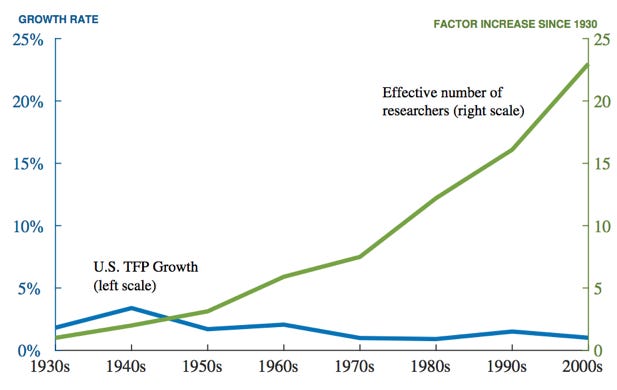🗽⤵ Why American growth falters despite abundant ideas
A new Census Bureau study finds that patents flourish but struggle to translate into the broader economy
My fellow pro-growth/progress/abundance Up Wingers,
A big theme of my 2023 book, The Conservative Futurist: America's half-century productivity slump (what I term the “Great Downshift”) represents a perfect storm of a) macroeconomic headwinds, b) self-inflicted policy wounds, and c) a profound cultural pivot.
The gains of the Great Inventions, as Northwestern University economist Robert Gordon calls them, of the second-stage of the Industrial Revolution (electrification, internal combustion engine, industrial chemicals) were largely harvested by the 1970s. That, just as research itself became demonstrably more difficult — the low-hanging fruit had already been picked —requiring exponentially more scientists to yield comparable breakthroughs. (More on this in a moment.)
The story only gets worse. Simultaneously, policymakers erected formidable barriers to progress. New regulatory regimes, such as the National Environmental Policy Act and its state-level counterparts — multiplied costs and timelines for everything from nuclear power to urban development, while ambitious projects from supersonic transport to space exploration saw federal R&D funding evaporate.
Most consequentially, however, was America's startling philosophical retreat from Up Wing to Down Wing. The environmental movement that emerged in the early 1960s came to fundamentally reject the notion that growth and ecological health could coexist. Vietnam-era disillusionment with what philosopher Lewis Mumford termed the "Megamachine" (the interconnected technological systems of military, industrial, and academic institutions forming a self-perpetuating juggernaut) transformed technological optimism into deep suspicion. Influential doomsday narratives cemented this pessimism in the national psyche — with a big (ongoing) assist from Hollywood.
The cost of this Down Wing shift has been incalculable, not merely in foregone GDP but also in our collective capacity to envision and build a better tomorrow. Now with the emerging Age of AI, America gets another bite at the apple. Let’s hope we have learned our lesson — the correct lesson.
Progress grows expensive
As such, I am super interested in a fresh working paper from the Census Bureau titled, "Growth Is Getting Harder to Find, Not Ideas,” which digs into one of the macro headwinds identified in the book (and mentioned above): Transformative ideas are becoming scarcer and more costly to unearth. In my book, I cite the well-known paper “Are Ideas Getting Harder to Find?” by economists Nicholas Bloom, Charles I. Jones, John Van Reenen, and Michael Webb in which they try to answer the eponymous question. They find, for instance, that advancing Moore's Law now requires 18 times more researchers than in the early 1970s. "Just to sustain constant GDP growth per person," the researchers conclude, "the US must double research effort every 13 years to offset the increasing difficulty of finding new ideas."
Also from the paper:
Our research shows that this pattern holds across a range of case studies. Whether we look at crop yields for corn and soybeans, or medical innovations that reduce mortality from heart disease and breast cancer, we find a similar trend. There have been technological improvements, but these require the devotion of ever-growing amounts of resources to the research process to maintain steady rates of improvement.
The relevant metaphor has thus shifted from picking low-hanging fruit to oil extraction — ideas lie deeper in more complex geological formations, requiring specialized teams and expensive equipment to access.
Patents versus productivity
The Census Bureau paper challenges this pessimistic diagnosis about research productivity. The central question is straightforward enough: Is economic deceleration caused by an ideas drought or by obstacles after ideas are conceived?
To investigate, the authors constructed a massive database of 90 percent of American patents filed since 1977 linked to their corporate owners. So a broader approach than Bloom & Co. This effort enabled the researchers to examine two distinct links in the innovation chain: from research effort to ideas, and from ideas to firm growth.
Two key parts to their findings: First, patent output per dollar spent on knowledge inputs has increased over time (0.46 to 0.62 patents per dollar of employee salaries). Similar improvements appeared in high-quality and breakthrough patents, challenging the notion that important new ideas are becoming harder to discover.
Second, while innovations still help companies grow sales, since around 2000, companies haven't grown as much as expected based on their innovation output. In other words, research labs continue creating valuable ideas, but the broader economy struggles to translate these innovations into widespread growth. The real bottleneck appears to be downstream from discovery — perhaps in a) how innovations spread throughout the economy, b) challenges in scaling them up, c) increased market concentration limiting competition, or d) regulatory barriers.
AI to rescue
The two papers are thus complementary: Team Bloom signals that something is amiss. Team Census pinpoints where the system is leaking Schumpeterian energy. For policymakers, this suggests continuing research funding while giving equal attention to competition policy, skills, infrastructure, deregulation, and other governmental mechanisms that might help novel ideas diffuse through the economy efficiently. (You would also want to make sure your economy isn’t shielded from global competitive pressures through protectionist trade barriers.)
AI might be of help here, of course. For instance:
Such systems might analyze patents from different fields to discover applications the original inventors never thought of.
AI could help navigate complicated regulations and pinpoint the best markets for scaling up technologies, while also helping policymakers direct resources to areas where innovation faces roadblocks
For researchers, AI could handle the routine analysis work, freeing up human brainpower for creative breakthroughs.
One thing’s for sure: This isn’t the final word on the subject.
As Congress Does Less, The Courts Are Doing More
Breaking news: The Dispatch has acquired SCOTUSblog, the gold standard in Supreme Court analysis.
Reliable coverage of the Supreme Court has never been more important. With an unbridled executive branch and a Congress eager to surrender its constitutional prerogatives, the federal judiciary is playing an increasingly important role in shaping the country’s direction.
Join 600,000 loyal readers and check out The Dispatch today. No insulting clickbait, no false outrage, no annoying auto-play videos—just reliable journalism that helps you understand the big decisions that will shape our nation’s future.
Faster, Please! readers: Take 25% off a Dispatch membership today
Micro Reads
▶ Economics
How to Make American Babies Again - WSJ Opinion
The trouble with MAGA’s manufacturing dream - Economist
GDP Drop Isn’t as Bad as It Looks - Bberg Opinion
▶ Business
▶ Policy/Politics
What If Bureaucracy Is… Good? - Bberg Opinion
▶ AI/Digital
Harnessing Artificial Intelligence for High-Impact Science - Berkeley Lab
Science, Promise and Peril in the Age of AI - Quanta Magazine
Microsoft’s Datacenter Freeze – 1.5GW Self-Build Slowdown & Lease Cancellation Misconceptions - SemiAnalysis
▶ Biotech/Health
How to Lead a Chronic Disease Revolution - WSJ Opinion
▶ Clean Energy/Climate
Fusion Breakthrough: Magnet Powerful Enough to Levitate an Aircraft Carrier Marks Final Step Before ITER Reactor Assembly - The Debrief
▶ Space/Transportation
The Cold War's Impact on SETI - Supercluster
▶ Up Wing/Down Wing
Indiana Faces a Data Center Backlash - Heatmap
▶ Substacks/Newsletters
How AI is Transforming Burnout in high-impact jobs - AI Supremacy
The Case for the Dire Wolf - Breakthrough Journal
What if the Good Samaritan Had Been in a Hurry? - Conversable Economist
America Needs A NEPA Defense Exemption - Green Tape
You Autor Know - First World Problems






